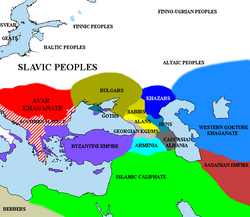Old Great Bulgaria
| Old Great Bulgaria | ||||||||||||||||
|
||||||||||||||||
|
Old Great Bulgaria
|
||||||||||||||||
| Capital |
Phanagoria (632–665) |
|||||||||||||||
| Languages | Bulgar | |||||||||||||||
| Religion | Paganism (Tengrism) | |||||||||||||||
| Government | Absolute Monarchy | |||||||||||||||
| Khan | ||||||||||||||||
| • | 632–665 | Kubrat | ||||||||||||||
| • | 665–668 | Batbayan | ||||||||||||||
| Historical era | Middle Ages | |||||||||||||||
| • | Kubrat inherits the throne | 632 | ||||||||||||||
| • | Batbayan inherits the throne | 665 | ||||||||||||||
| • | Old Great Bulgaria is conquered by the Khazars | 668 | ||||||||||||||
|
||||||||||||||||
| Today part of | ||||||||||||||||
in Anatolia
Artuqid dynasty
Saltuqid dynasty
in Azerbaijan
Ahmadili dynasty
Ildenizid dynasty
in Egypt
Tulunid dynasty
Ikhshidid dynasty
in Fars
Salghurid dynasty
in The Levant
Burid dynasty
Zengid dynasty
in Yemen
Rasulid dynasty
Old Great Bulgaria or Great Bulgaria (Byzantine Greek: Παλαιά Μεγάλη Βουλγαρία, Palaiá Megálē Voulgaría), also often known by the Latin names Magna Bulgaria) and Patria Onoguria ("Onogur land"), was a 7th Century state formed by the Bulgars and Onogurs on the western Pontic Steppe (modern southern Ukraine and south-west Russia). Great Bulgaria was originally centred on Phanagoria, between the Dniester and lower Volga, (in modern Krasnodar Krai, Russia).
In the mid-7th century, Great Bulgaria expanded west to include Avar territory and was centered in Poltava. During the late 7th century, however, an Avar-Slavic alliance in the west, and Khazars in the east, defeated the Bulgars and the Great Bulgaria disintegrated. Successor states included the First Bulgarian Empire and Volga Bulgaria.
...
Wikipedia

